
TRƯỜNG ĐẠI HỌC THƯƠNG MẠI
KHOA TIẾNG ANH
NGHIÊN CỨU KHOA HỌC CẤP TRƯỜNG
DESIGNING A TASK-BASED WRITING SKILL SYLLABUS
INTEGRATED WITH WORKING SKILLS FOR THE SECOND-YEAR
ENGLISH MAJORS OF THUONG MAI UNIVERSITY
THIẾT KẾ CHƯƠNG TRÌNH DẠY KỸ NĂNG VIẾT THEO NHIỆM VỤ KẾT
HỢP ĐỊNH HƯỚNG PHÁT TRIỂN NGHỀ NGHIỆP CHO SINH VIÊN NĂM
HAI KHOA TIẾNG ANH TRƯỜNG ĐẠI HỌC THƯƠNG MẠI
Người thực hiện : Ths. Trần Lan Hương
Đơn vị công tác : Khoa tiếng Anh
HANOI, 2017

Page i
DECLARATION
I hereby declare that this thesis is a presentation of my original research work.
Wherever contributions of others are involved, every effort is made to indicate this
clearly, with due reference to the literature, and acknowledgement of collaborative
research and discussions.
Signature
Tran Lan Huong

Page ii
ACKNOWLEDGEMENTS
I would also like to express special thanks to all the English staff and the second-
year English majors of Thuong Mai University for their contribution to the data
collection and their constructive suggestions for this research.

Page iii
ABSTRACT
The thesis was aimed at designing a practical, feasible and enjoyable writing skills
syllabus for the second-year English majors of Thuong Mai University (TMU).
The study started with the situational and needs analysis based on Hutchinson and
Water (1987). The situational and needs analysis were conducted in TMU with the
employment of the following research instruments: two questionnaires for teachers
and students, and the students’ writing papers, the CEFR (2001) and the current
writing skills syllabus. The informants of the study include all 62 second-year
English majors and 10 teachers of English major section in TMU.
The results of the situational and need analysis show that there is no separated
textbook and syllabus to meet the needs of both the university and the students in
terms of its objectives and contents. The new sets of objectives which emphasize
the communicative competence of the learners in their desirable target situations
were re-determined in accordance with their needs. To best serve the objectives of
the course and learning style preferences of the students, task based was chosen as
the approach driving the design of the new syllabus in which the target tasks in four
main domains: the personal, the public, the occupational and the educational were
derived from the target needs analysis and selected to suit the current level of the
learners (CEF A1+ -A2).

TABLE OF CONTENTS
DECLARATION ........................................................................................................ i
ACKNOWLEDGEMENTS ....................................................................................... ii
ABSTRACT .............................................................................................................. iii
TABLE OF CONTENTS ........................................................................................... i
TABLE OF FIGURES ............................................................................................. iv
PART 1: INTRODUCTION....................................................................................... 1
1. Rationale ............................................................................................................. 1
2. Aims and Objectives of the study ....................................................................... 3
3. Scope of the study ............................................................................................... 3
4. Research questions .............................................................................................. 4
5. Design of the study ............................................................................................. 4
PART 2: DEVELOPMENT ....................................................................................... 5
Chapter 1: Literature review ................................................................................... 5
1.1. Approaches to Teaching Writing for Specific PurposeError! Bookmark not defined.
1.1.1. Product Oriented Approaches .............. Error! Bookmark not defined.
1.1.2. Process Oriented Approaches .............. Error! Bookmark not defined.
1.1.3. Genre Approaches................................ Error! Bookmark not defined.
1.2. Task-Based Approaches ............................. Error! Bookmark not defined.
1.2.1. Tasks and types of tasks ...................... Error! Bookmark not defined.
1.2.1.1. Target Tasks ................................. Error! Bookmark not defined.
1.2.1.2. Learning Tasks ............................. Error! Bookmark not defined.
1.2.2. The framework of TBLT applied in teaching writingError! Bookmark not defined.
1.3. Task-Based syllabus (TBS) ................ Error! Bookmark not defined.
Chapter 2: Methodology ........................................................................................... 5
2.1 . Setting of the study .................................................................................... 28
2.2 . Informants. ................................................................................................. 28
2.3 . Data collection instruments ........................................................................ 29
2.4 . Data collection and data analysis procedure. ............................................. 30

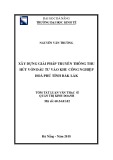


![PET/CT trong ung thư phổi: Báo cáo [Năm]](https://cdn.tailieu.vn/images/document/thumbnail/2024/20240705/sanhobien01/135x160/8121720150427.jpg)
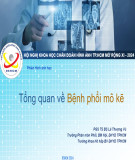
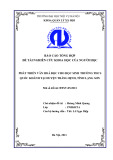

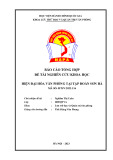
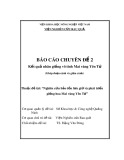
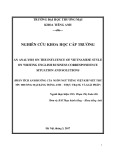








![Bộ Thí Nghiệm Vi Điều Khiển: Nghiên Cứu và Ứng Dụng [A-Z]](https://cdn.tailieu.vn/images/document/thumbnail/2025/20250429/kexauxi8/135x160/10301767836127.jpg)
![Nghiên Cứu TikTok: Tác Động và Hành Vi Giới Trẻ [Mới Nhất]](https://cdn.tailieu.vn/images/document/thumbnail/2025/20250429/kexauxi8/135x160/24371767836128.jpg)





